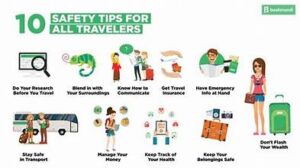Solo travel offers a unique sense of freedom and adventure, but it also comes with its own set of risks. Ensuring your safety while traveling alone requires a blend of preparation, awareness, and smart decision-making. Here are essential solo travel safety tips for 2024 to help you stay secure on your adventures.
1. Research Your Destination Thoroughly
Before embarking on your journey, invest time in researching your destination. Understand the local customs, cultural norms, and potential risks. Familiarize yourself with local emergency services, healthcare facilities, and travel advisories issued by your government. Websites like the U.S. Department of State or the UK Foreign and Commonwealth Office provide updated travel warnings and safety tips.
Action Tip: Create a travel safety checklist specific to your destination, noting important contact numbers and emergency procedures.
2. Share Your Travel Itinerary
Inform trusted friends or family members about your travel plans. Share your itinerary, accommodation details, and any significant changes in your plans. Regularly update them on your whereabouts, especially if you’re moving from one location to another.
Action Tip: Use apps like Google Maps to share your real-time location with loved ones.
3. Secure Your Belongings
Keep your valuables secure. Use a money belt or hidden pouch for essential items like cash, credit cards, and identification. When staying in hostels or hotels, utilize the provided safes or lock your luggage securely. Avoid displaying expensive items like jewelry or electronics in public.
Action Tip: Consider investing in anti-theft backpacks with lockable zippers and cut-resistant straps.
4. Stay Aware of Your Surroundings
Being alert to your surroundings is crucial. Avoid distractions such as looking at your phone or wearing headphones while walking in unfamiliar areas. Pay attention to local behaviors and trust your instincts. If something feels off, remove yourself from the situation.
Action Tip: Practice situational awareness by observing the body language and behavior of people around you.
5. Keep Emergency Contacts Handy
Save important contact numbers on your phone and carry a physical copy as a backup. This includes local emergency services, your country’s embassy or consulate, and the nearest hospital. Additionally, have a list of emergency contacts from home.
Action Tip: Program these numbers into your phone under a label like “Emergency Contacts” for quick access.
6. Avoid Risky Situations
Steer clear of risky behaviors that could jeopardize your safety. Avoid walking alone late at night in unfamiliar areas, and be cautious when accepting invitations from strangers. Use reputable transportation services and avoid hitchhiking.
Action Tip: Choose well-lit and populated areas for nighttime activities, and always use licensed taxis or rideshare services.
7. Practice Digital Safety
Be cautious with your digital presence. Avoid accessing sensitive information over public Wi-Fi networks. Use a VPN (Virtual Private Network) to protect your online activities. Ensure that your devices have strong, unique passwords and enable two-factor authentication where possible.
Action Tip: Regularly update your device’s security software and be wary of phishing attempts.
8. Learn Basic Local Phrases
Learning a few basic phrases in the local language can enhance your safety. Simple expressions like “Where is the nearest hospital?” or “I need help” can be invaluable in emergencies. This effort also demonstrates respect for the local culture and can foster goodwill.
Action Tip: Use language-learning apps or carry a phrasebook to help with communication.
9. Stay Informed About Local Laws and Customs
Understanding local laws and customs helps avoid inadvertently offending locals or breaking laws. Research cultural practices related to dress code, behavior, and social norms. This knowledge can prevent misunderstandings and ensure a more respectful experience.
Action Tip: Check out travel forums or consult with locals to gain insight into specific customs or regulations.
10. Have a Backup Plan
Always have a backup plan in case things go awry. This includes having alternative accommodation options and a contingency plan for unexpected changes in your travel schedule. Keep copies of important documents like your passport and visa in a separate location from the originals.
Action Tip: Prepare a list of local contacts, such as hostels or tourist information centers, that can assist in case of emergencies.
Conclusion
Solo travel can be an enriching and transformative experience when approached with the right precautions. By thoroughly researching your destination, staying aware of your surroundings, securing your belongings, and practicing digital safety, you can significantly reduce potential risks. Remember, preparation and awareness are key to a safe and enjoyable solo adventure in 2024.


